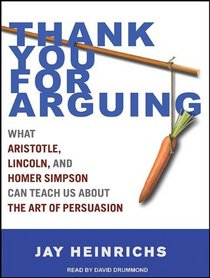If Dave Barry decided to write a book introducing readers to classical rhetoric and its modern uses, it would read like this book. Jay Heinrichs uses a comfortable informal style to introduce the rhetorical tenants of Aristotle and Cicero, while giving practical modern uses for the rhetorical skills introduced. Using sometimes-humorous examples, Heinrichs explores applications of each concept he introduces pulled from his experiences with family, co-workers, and neighbors. Readers who want the Greek terminology of Aristotle will find them included--but the author does not dwell on them, making this an informing but not overwhelming introduction to the art of rhetoric.
I recommend this book to college students and adults looking for an introduction to rhetoric--but not to younger high school students. As one of the concepts of persuasion is seduction (i.e. to seduce an audience), the author does not avoid the obvious allusion to make his point. His language and examples are never inappropriate, but parents and educators should preview this book first before passing it on to younger students.
I recommend this book to college students and adults looking for an introduction to rhetoric--but not to younger high school students. As one of the concepts of persuasion is seduction (i.e. to seduce an audience), the author does not avoid the obvious allusion to make his point. His language and examples are never inappropriate, but parents and educators should preview this book first before passing it on to younger students.




